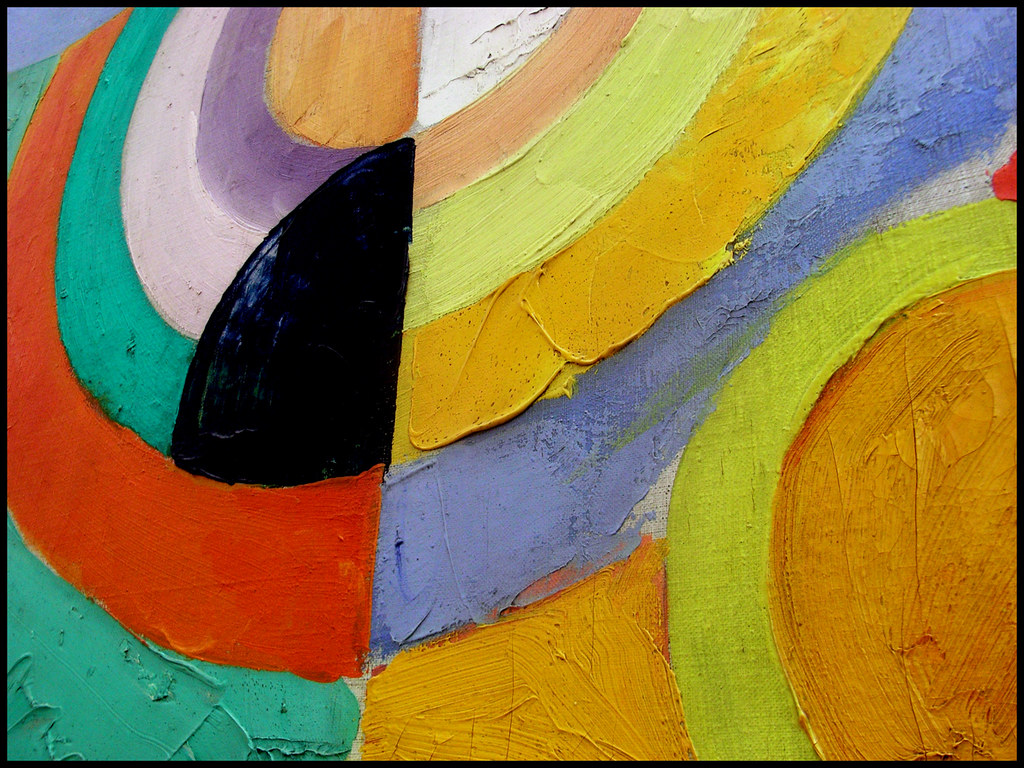.

Joie de Vivre (detail): Robert Delaunay, 1930; image by Florie Milet, 8 December 2008 (Centre Pompidou, Paris)
When you look at colors, the intuitions of fantasy, in contrast to the creative imagination, manifest themselves as a primal phenomenon. All form, every outline that man perceives, corresponds to something in him that enables him to reproduce it. The body imitates itself in the form of dance, the hand imitates and appropriates it through drawing. But this ability finds its limits in the world of color. The human body cannot produce color. It does relate to it not creatively but receptively: through the shimmering colors of vision... In short, pure color is the medium of fantasy, a home among clouds for the spoiled child, not the strict canon of the constructive artist.
-- Walter Benjamin, from The World of Children's Books, 1926, tr. by Rodney Livingstone in Walter Benjamin: Selected Writings, Volume I: 1913-1926, 1996

Joie de Vivre (detail): Robert Delaunay, 1930; image by Florie Milet, 8 December 2008 (Centre Pompidou, Paris)

Joie de Vivre (detail): Robert Delaunay, 1930; image by SandrineT, 2 August 2010 (Centre Pompidou, Paris)

Joie de Vivre (detail, bottom right corner): Robert Delaunay, 1930; image by SandrineT, 2 August 2010 (Centre Pompidou, Paris)

Joie de Vivre: Robert Delaunay, 1930; image by SandrineT, 2 August 2010 (Centre Pompidou, Paris)

Simultaneous Contrasts: Sun and Moon (detail): Robert Delaunay, 1912-1913; image by Marcia Hansen, 14 November 2009 (Museum of Modern Art, New York)

Simultaneous Contrasts: Sun and Moon (detail): Robert Delaunay, 1912-1913; image by Marcia Hansen, 14 November 2009 (Museum of Modern Art, New York)

Simultaneous Contrasts: Sun and Moon (detail): Robert Delaunay, 1912-1913; image by Marcia Hansen, 14 November 2009 (Museum of Modern Art, New York)

Simultaneous Contrasts: Sun and Moon: Robert Delaunay, 1912-1913; image by OfOrebOrOfSinai, 30 November 2008 (Museum of Modern Art, New York)

Rhythme: Robert Delaunay, 1938; image by SandrineT, 28 April 2009 August 2010 (Musee d'Art Moderne, Paris)

Rhythme (detail): Robert Delaunay, 1938; image by SandrineT, 28 April 2009 August 2010 (Musee d'Art Moderne, Paris)

Rhythme (detail): Robert Delaunay, 1938; image by SandrineT, 28 April 2009 August 2010 (Musee d'Art Moderne, Paris)
Some earlier swashes...
ReplyDeleteColour Separation (Goethe's Theory of Colour)
Poetics of Colour (Goethe/Rimbaud)
But what about color in nature? The greens of the moss I was looking at yesterday were better than anything in my imagination.
ReplyDeleteArtur.
"The human body cannot produce color."
ReplyDeleteYes, but other kinds of bodies evidently can.
(Benjamin appears to have been more of an "indoors type"?)
Dr. Johnson is said to have loved a good roll down a steep green hill, as a therapy for scrofula.
ReplyDeleteHe ought have taken Walter by the hand and conducted him for a proper roll down the slope among Artur's extremely green mosses, grasses and lichens.
Possible all purpose cure for neurasthenia, ghostly pallor due to overuse of midnight oil, excessive intellectualism, & c.
I don't know this artist . . . Wow! I have to do some homework. I love it.
ReplyDeleteVERTIGO IN DETROIT WRITES:
ReplyDeleteWhen I scroll down too fast, it's like rolling down that hill with Dr. J INSIDE a roller coaster! Stop, please TC, stop before I yawn all the technicolors in and beyond nature...
Wait! That was just late-night celebratory dizziness at the Yankees expense. Now back to our regular TC programming.
ReplyDeleteWow, amazing. Thanks for the exposure(s).
ReplyDeleteTom,
ReplyDeleteBeautiful to see all of this -- "When you look at colors" (really look at colors) . . . a few white clouds in all that blue, now that the rain is gone. . . .
10.7
pink white cloud in sky above blackness
of ridge, shadowed green leaf on branch
in foreground, wave sounding in channel
perhaps passed over silence,
reflect the fact that
proximity of it in it, more
than that, as much as
shadowed canyon of ridge across channel,
white cloud in bright blue sky above it
Robert Delaunay and Sonya Delaunay and Walter Benjamin were all city folk. But then so was Dr Johnson. I'd like to have seen him rolling down a hill, I'm thinking, probably, Parliament Hill & Hampstead Heath. I may have a roll myself, tomorrow. It's an inexpensive cure for excesses of all kinds.
ReplyDeleteThis is simply fabulous. Curtis
ReplyDeleteI forgot to say, it's refreshing to see the Delaunays from an oblique angle. I'm so used to seeing them straight on, and it's easy to forget their physical presence when it's a rectangular orthogonal image seen in a book.
ReplyDeleteArtur.
Thank you very much, Kent, Steve, Peter, Artur and Curtis.
ReplyDeleteYes, Artur, with the Delaunays, the unusual angles, close-ups, croppings, do bring our attention to bear on the local textures of the work in a way that's revelatory.
The place of colour wheels and geometric schema in the conception of such works has perhaps been a bit over-rated. Granted "concept" is currently credited above "execution" (it's so much lighter, faster, more portable, like an IPhone), still, when one gets a close look at the rich impasto, the bold strokes of the brush, the "wet" feel imparted by rapid work, it's the physical presences of eye/body/hand that seem to be giving all the glory.
Not that the concept was half-bad... but just saying.
Artur, about hill-rolling...
Well, your beautiful hill looks perhaps a bit less "civilized" than Johnson might have preferred, a bit too... shall we say natural?
Not a smooth, silky roll, that; more of a full metal jacket sort of venture.
One imagines Johnson, hearing this from the coffee house of the shades, mumbling, "Well, yes, such as the hills in Scotland".